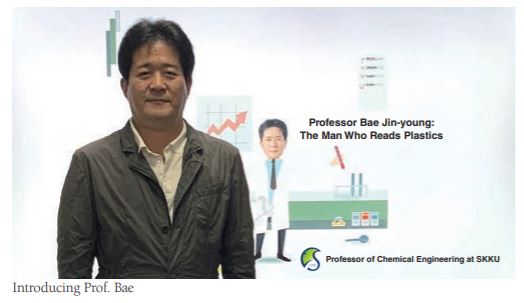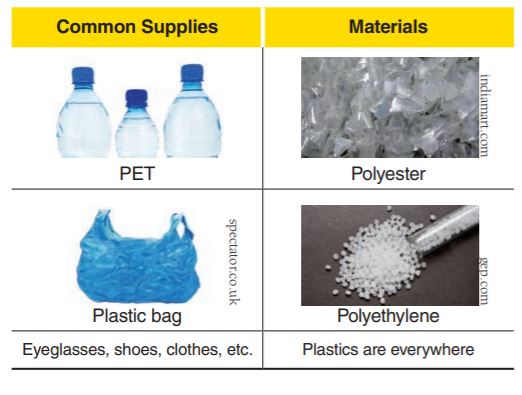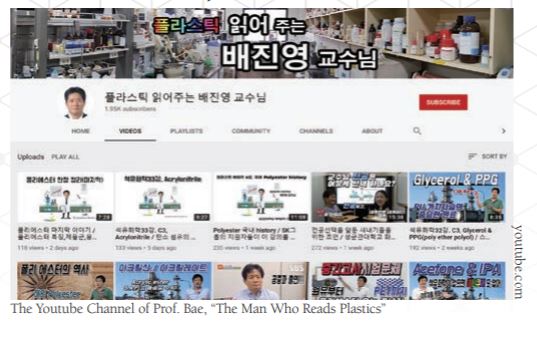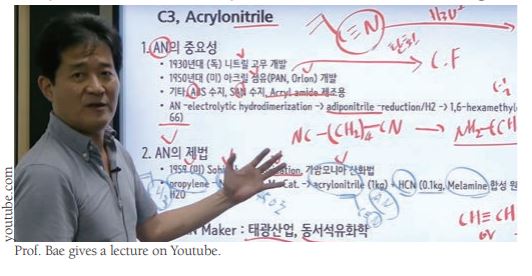I n daily modern life, plastics are always there around us, from computers and smartphones to aircraft. People are familiar with plastics, but knowing plastics “well” is not easy stuff; because there are unfamiliar notions like chemistry and polymers in the fundamentals of plastics. In this situation, there is one man who is trying to make his voice heard and to widen public understanding about plastics. The man is Bae Jin-young, a Professor of Chemical Engineering at Sungkyunkwan University (SKKU) and he is trying hard to communicate with people about polymeric materials. The Sungkyun Times (SKT) met Professor Bae to find out more.
Bae Jin-young: Professor of Chemical Engineering
Q1. Please introduce yourself to the Kingos.
I joined SKKU as an Applied Chemistry professor in 1997 and have worked for SKKU for 23 years. I am working for SKKU as a Professor of Chemical Engineering now.

Q2. Please tell us about your journey through life, after you became a chemical engineer.
I got a bachelor’s degree in the department of industrial chemistry at Seoul University, and I started work at SK Chemical in 1986. After I joined the company, I had a chance to be introduced to plastics. With this as a momentum, I studied plastics and got a Ph.D. in Chemical Engineering, and since then, I gradually moved to my post as a professor. Moreover, at that time, the petroleum industry was given focus in Korea, like the textile industry in the past and semiconductor industry in the present. This allowed me to proceed in chemical engineering further.
Q3. The words “chemistry” and “polymer” may not be properly understood by most people. Please explain these words and what they mean.
Chemistry and polymer are too broad areas, so I will describe them simply for your understanding. People who love wine generally say it is the nectar of gods. Similarly, people who are involved in chemistry often say that black water, petroleum, is the black pearl of Earth. It means petroleum is a gift from Earth. In this sense, I define chemistry as all processes that refine petroleum. Also, we often describe a tall person as a giant and a small person as a dwarf; in the same way, chemists describe molecules with great molar mass as polymers and vice versa. There are various chemical products like glue, and shampoo, but the most important chemical product is plastics. Chemistry and polymers are fundamentals of industries as much as plastics often are said to be the grain of the industry. People need chemical products to maintain their daily routines, and as a result, people make familiar relationships with plastics unconsciously. Thus, polymers are used in chemistry, so they also have an intimate connection with people even if they are often unnoticed. Whether people know it or not, human lives and plastics are inseparable.

Curator of the Chemistry World: Translational Chemist, Prof. Bae
Q4. In early 2019, you opened a Youtube channel, “The Plastic Reader Prof. Bae”. Please introduce it to Kingos.
This is a channel to explain the specialized courses of chemistry related to plastics in the easiest way possible. The core factor is “reading”. I named it to explain plastics to people in an easier way than any others. Moreover, it implies the meaning of storytelling. I know there is a myth that chemistry is a memorizing-centered study, but I reject this perspective. I decided to help people to understand chemistry in the way of storytelling. Also, I weigh more on education than research as a professor. Giving lectures to undergraduates is education, but this method has a limited audience, time and space. My goal is to give information to the public, not only to the students, so I chose Youtube as a channel to communicate with the public because it has a low entry barrier.

Q5. Plastics and environmental problems have been inseparable recently. Did it affect you in creating the channel?
Recently, there have been some controversial issues about plastics such as returned plastic waste from the Philippines to Korea and a turtle stabbed in its nose with a plastic straw. Because of these sorrowful incidents, some people have started to treat plastics as a deep-rooted evil. A plastic, however, is an object of problem-solving, not evil. First, when making products, the three materials, metal, ceramic and plastic are necessary. Without these materials, people cannot make any products. Second, plastic takes up a large part of the Korean industry. Lastly, due to packaging and delivery, people have made lots of plastic junk, and this is the fundamental factor in creating environmental issues with plastics. That is, the behavior patterns of people worsen the Earth’s environment. Consequently, from the critical mind that the pervasive myth among people is not true, I opened the channel, and I think the right education should be made available to people to have the right sense about plastics. Furthermore, solving plastic problems should not be the responsibility of specialists in universities, but should be of all people on the earth.
Q6. I heard you “read” plastics before, but in the channel’s playlists, there are many major level chemistry lectures, which are unusual contents on Youtube. Is there a special reason you set the level like that?
I set the standard with the editor of my Youtube channel. As I said before, Youtube has the feature that means anyone can upload their creations. Therefore, I thought maintaining a specialty as a professor of the area is better than vice versa, so I am dealing with somewhat difficult chemistry contents. Currently, the main target of the videos is sophomores and seniors of chemistry majors, so the main viewers of the channel are job applicants and employees in chemical industries. This is not what I expected, but I aim to make easily understood chemistry contents like the movie, Avengers.

Q7. It seems like you have to prepare a lot before giving a lecture. How do you prepare your content?
Operating the channel, I have felt the significance of contents, that is, the contents I am using in school is not enough. Thus, I am developing content for the channel. The developing process is based on the pedagogical data I have researched for 30 years, and focuses on storytelling, substituting terminology with normal words people often use. Also, I majored in materials, so I often liken lecture contents to foods. The gap between my object to “read” plastics and reality is on my lectures now, but I will consistently narrow the gap.
Q8. There have been contents communicating with Kingos on your channel recently. What is the momentum for making this?
As I said before, I am also a member of the Kingos, and I love SKKU. I started the contents, wishing more and more Kingos would view the channel, even though the channel is public. Plus, a graduate pupil of SKKU has taken the editor position now. Thus, theses contents are meaningful to me.
Q9. Is there any plan to make new content?
I have a plan to make Organic Chemistry content. It is the branch of chemistry where most people give up chemistry. In other words, people feel it is the hardest part of chemistry. There are some simple Organic Chemistry contents on the channel now, but I aim to give lectures of it more broadly and easily. Currently, I have no time to take action to edit ongoing content and prepare school lectures. If I have a chance someday, I will take action right then.
Seeing the Future in Plastic
Q10. Please introduce briefly your ongoing research projects.
I am researching an eco-plasticizer, which means adding flexibility to plastics. It is a plasticizer with endocrine-disrupting free chemicals. I have critical thoughts about the endocrine-disruptor in plastics, so I take part in eco plasticizer research.
Q11. Today, there is an environmental crisis with plastics. What is your view about the future of plastics and Earth’s environment?
To solve the environmental problems regarding plastics, people should answer the question: Did human beings ruin the environment or did plastics? Today, it is not only the public but also specialists who have a critical view that plastics connote some problems. Furthermore, groups of specialists have developed a critical perspective, and have made efforts to soothe the problem. Biodegradable plastics are one way to resolve the problem. A good material degrades after the proper time, but plastics do not. From this point, the concept of biodegradable plastics has emerged, and they degrade in a shorter time, unlike general plastics. Adding more detail, disposing of plastic waste can be likened to the funeral culture of humans. As there are burials or cremations in funeral culture, digging waste into the soil or burning it is the way of plastic waste disposal. As biodegradable plastics can be one method, if various solutions are realized, the problem related to plastics will be mended soon.
Q12. Any last words for the Kingos?
As many Kingos have visited the channel and viewed the lectures, I always get the energy to propel to the goal, giving specialized plastic chemistry information to the public. And I will keep on delivering the information to people. Also, I would like to say to all Kingos that you should do your best in whatever you do. Educate yourself from anything laid in front of you. First and foremost, however, please put yourself in a fun atmosphere. Enjoy your lives!
